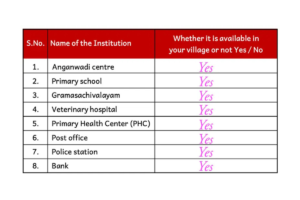Your cart is currently empty!
Chapter 7: Who Serves us? | Class 5 | EVS | Textbook Solutions
AP SCERT | Andhra Pradesh
Home » Solutions » Class 5 » EVS Textbook Solutions » Chapter 7: Who Serves us?
Here are the solutions to Improve your learning.
I. Conceptual understanding
1. What are the three levels of Government in India?
The three levels of Government in India are:
1. Local Self-Government – This operates at the village and city levels. It includes institutions like Gram Panchayats in villages and Municipalities/Municipal Corporations in towns and cities.
2. State Government – Each state has its government, headed by the Chief Minister and the Council of Ministers.
3. Central Government – The prime minister heads the national government, with the President as the constitutional head. It provides services like defence, railways, and telecom for the entire country.
2. Mention five important functions of Gram Panchayat.
Five important functions of a Gram Panchayat are:
1. Providing basic amenities such as safe drinking water and drainage facilities.
2. Maintaining village roads and other infrastructure.
3. Overseeing sanitation by ensuring cleanliness and proper waste management.
4. Implementing government schemes for rural development and welfare.
5. Managing public institutions like schools, hospitals, and other services in the village.
3. Which Mandal do you belong to? Mention the names of different Mandal-level Officers?
I belong to Kovur mandal in the Nellore district. The different Mandal level officers are:
1. Mandal Parishad Development Officer (MPDO) – Oversees welfare and development activities.
2. Tahsildar – Manages land records, issues certificates, and supervises revenue matters.
3. Mandal Education Officer (MEO) – Ensures proper education and implementation of programs in schools.
4. Station House Officer (SHO) – Heads the police station and maintains law and order.
5. Health Officer – Manages health services and implements national health programs.
II. Questioning and hypothesis
4. What questions would you ask the Village Secretary to learn about the functions of the Gram Panchayat?
Here are some questions I could ask the Village Secretary to gather information about the functions of the Gram Panchayat:
1. What are the key responsibilities of the Gram Panchayat in providing basic services to the village?
2. How does the Gram Panchayat manage waste disposal and maintain sanitation in the village?
3. What role does the Gram Panchayat play in maintaining roads and other infrastructure?
4. How are government schemes implemented at the village level, and what are some recent examples?
5. What steps are taken to ensure access to clean drinking water and other essential amenities for all villagers?
III. Experiments and field observations
5. Collect the following information and fill in the table with correct answers.

IV. Information skills and projects
6. Talk to a sweeper working in panchayat office and write your observations.
Conversation:
Me: “Hello, uncle/aunty! Thank you for keeping our office clean. Can I ask you a few questions about your work?”
Sweeper: “Of course, ask me anything!”
Me: “What kind of tasks do you do every day at the Panchayat office?”
Sweeper: “I sweep the office and surrounding areas, clean the drains, and ensure that the garbage is collected and sorted properly. I also help in spraying bleaching powder to keep the area sanitary.”
Me: “That sounds like hard work. What do you enjoy about your job?”
Sweeper: “I feel proud to keep the village clean, and I like that my work helps everyone stay healthy.”
Me: “Thank you for sharing! It’s great to learn about what you do.”
Observations:
Today, I spoke to a sweeper who works at the Panchayat office. His/her job involves sweeping the floors, cleaning the drains, and managing garbage disposal. He/she also ensures that the area stays sanitary by spraying bleaching powder. I noticed that this job is very important for our village’s cleanliness and helps maintain hygiene. The sweeper told me that he/she feels proud of their work because it helps everyone in the village. I learned that every job, no matter how big or small, is important for the community’s well-being.
V. Drawing and Model Making
7. Draw the map of your village and mark the institutions.

VI. Appreciation, values, application to daily life, biodiversity.
8. Your school is a public institution and it is a public property. What measures should you take to protect the school?
To protect your school, which is a public institution and public property, you can take the following measures:
1. Keep the surroundings clean: Avoid littering and use dustbins to dispose of waste properly.
2. Respect school facilities: Do not damage desks, chairs, walls, or any school property. Report any damages to teachers.
3. Use water and electricity wisely: Turn off lights, fans, and taps when not in use to save resources.
4. Participate in maintenance activities: Join school cleanliness drives and help keep classrooms and playgrounds tidy.
5. Avoid vandalism: Encourage your friends not to write on walls or damage school furniture.
6. Follow rules and be responsible: Treat the school with care, just as you would with your own home, and follow school guidelines.
7. Report issues: If you notice any broken or unsafe areas, inform teachers or school staff so they can take action.
These small steps ensure the school remains a safe, clean, and welcoming place for all students.